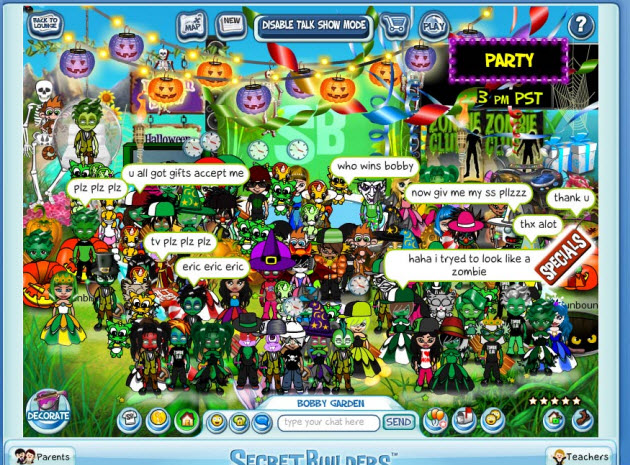
Both sites will remain operational but SecretBuilders will try to migrate as many of Dizzywood’s 1.5 million registered users as it can to SecretBuilders, which targets kids ages five to 14. It’s one more example that shows virtual worlds aren’t as hot as they used to be and there are plenty of winners and losers in this market. In the past year, virtual worlds such as Metaplace, Vivaty, Lively by Google, There.com and others have shut down. Gaia Online and Linden Lab have laid off staffers.
[aditude-amp id="flyingcarpet" targeting='{"env":"staging","page_type":"article","post_id":233245,"post_type":"story","post_chan":"none","tags":null,"ai":false,"category":"none","all_categories":"business,games,","session":"B"}']San Mateo, Calif.-based SecretBuilders is also one of the survivors. Started in 2007, the company has more than 1 million unique monthly players and it has nearly 2 million registered users, said Umair Khan, chief executive. The user base is now growing by about 500,000 per quarter, even though the company doesn’t spend money on advertising. Part of the success is that SecretBuilders has repositioned itself, focusing more on kids casual games and less on building out a full virtual world. SecretBuilders has 12 sections where kids can learn about art and literature as they play dozens of mini games. Khan says the goal is to be “engaging and enriching.” The educational part has enabled SecretBuilders to be used in more than 1,500 schools.
AI Weekly
The must-read newsletter for AI and Big Data industry written by Khari Johnson, Kyle Wiggers, and Seth Colaner.
Included with VentureBeat Insider and VentureBeat VIP memberships.
But Khan said his company wants to expand to new platforms. For instance, SecretBuilders is available on the Android-based Samsung Galaxy Tab tablet computer now. And it will become available on other platforms such as Facebook in the coming months. With the addition of Dizzywood, SecretBuilders will have more kindred users.
“In the future, we want to be on all the platforms that people consider to be electronic babysitting devices,” said Khan, noting that parents often give kids their phones to distract them.
Khan said the company’s metrics are looking good. The maximum number of concurrent users — or those playing at the same time — is now three times what it was just four months ago and the number of people logging in daily is double what it used to be.
Dizzywood was started in 2008 by Scott Arpajian and it raised $1 million from Charles River Ventures and Shelby Bonnie. Although the virtual world craze isn’t as huge as it used to be, Khan is encouraged that more kids are going online at an earlier age. On Facebook, there are also a lot of young kids who play games with their parents. And the number of kids using mobile phones is starting to grow. That means that casual games aimed at kids will be a growing market, Khan said.
Khan is targeting kids with some proven features such as dress-up and personalization, home decoration, socialization, adventures and quests, and fun games. The company has 24 employees. Secret Builders has raised $4 million to date from The Entrepreneurs’ Fund, Launch Capital, Scott Hassan (co-founder eGroups, founding team member of Google), Michael Tanne (former CEO of Adforce), David Jeske (former Director of Applications, Google), Sheila Marcelo (CEO of Care.com), John Welch (CEO of MakingFun), Sohaib Abbasi (CEO of Informatica), and Ken Morse (co-founder of 3COM).
VentureBeat's mission is to be a digital town square for technical decision-makers to gain knowledge about transformative enterprise technology and transact. Learn More
